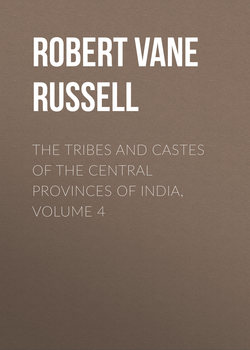Читать книгу The Tribes and Castes of the Central Provinces of India, Volume 4 - Robert Vane Russell - Страница 50
Part II
Articles on Castes and Tribes
Kumhār—Yemkala
Vol. IV
Kurmi
11. Polygamy widow-marriage and divorce
ОглавлениеA girl who becomes pregnant by a man of the caste before marriage is wedded to him by the rite used for widows. If the man is an outsider she is expelled from the community. Women are much valued for the sake of their labour in the fields, and the transgressions of a wife are viewed with a lenient eye. In Damoh it is said that a man readily condones his wife’s adultery with another Kurmi, and if it becomes known and she is put out of caste, he will give the penalty feasts himself for her admission. If she is detected in a liaison with an outsider she is usually discarded, but the offence may be condoned should the man be a Brāhman. And one instance is mentioned of a mālguzār’s wife who had gone wrong with a Gond, and was forgiven and taken back by her husband and the caste. But the leniency was misplaced as she subsequently eloped with an Ahīr. Polygamy is usual with those who can afford to pay for several wives, as a wife’s labour is more efficient and she is a more profitable investment than a hired servant. An instance is on record of a blind Kurmi in Jubbulpore, who had nine wives. A man who is faithful to one wife, and does not visit her on fast-days, is called a Brahmachari or saint and it is thought that he will go to heaven. The remarriage of widows is permitted and is usual. The widow goes to a well on some night in the dark fortnight, and leaving her old clothes there puts on new ones which are given to her by the barber’s wife. She then fills a pitcher with water and takes it to her new husband’s house. He meets her on the threshold and lifts it from her head, and she goes into the house and puts bangles on her wrists. The following saying shows that the second marriage of widows is looked upon as quite natural and normal by the cultivating castes:
“If the clouds are like partridge feathers it will rain, and if a widow puts lamp-black on her eyes she will marry again; these things are certain.”60
A bachelor marrying a widow must first go through the ceremony with a ring which he thereafter wears on his finger, and if it is lost he must perform a funeral ceremony as if a wife had died. If a widower marries a girl she must wear round her neck an image of his first wife. A girl who is twice married by going round the sacred post is called Chandelia and is most unlucky. She is considered as bad or worse than a widow, and the people sometimes make her live outside the village and forbid her to show them her face. Divorce is open to either party, to a wife on account of the impotency or ill-treatment of her husband, and to a husband for the bad character, ill-health or quarrelsome disposition of his wife. A deed of divorce is executed and delivered before the caste committee.
60
Elliot, Hoshangābād Settlement Report, p. 115.
